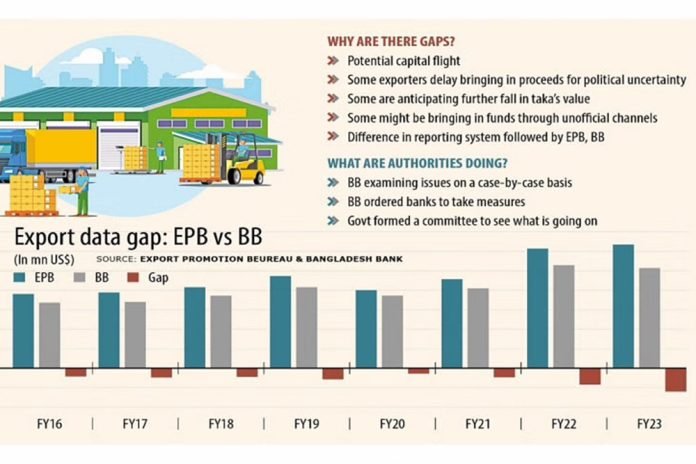The Export Promotion Bureau (EPB) has outlined five factors, including the classification of local sales by factories in export processing zones as exports, as potential explanations for the $12 billion mismatch between reported export proceeds and actual shipments in the last fiscal year.
According to rules, factories located in export zones can sell goods as raw materials to others with bonded warehouse facilities, and such transactions are considered deemed exports. The other reasons include differing dollar rates at Sonali Bank and the Bangladesh Bank, short shipments, discounts imposed by buyers, foreign bank charges, and not excluding goods returned by buyers from the export portion.
A short shipment describes the absence, non-delivery, or incomplete fulfilment of cargo on a shipping list. Not excluding products from the customs database after inclusion, especially when they are not actually exported, and the double counting of the goods are among the identified factors. Additionally, the inclusion of raw materials sent free of charge by buyers in export calculations is also assigned as a reason behind the difference in export data.
Sources at the EPB reveal that these reasons have already been identified and forwarded to the commerce ministry. Based on this information, the ministry will prepare and publish a report. An official of EPB said if these calculations are considered, we believe that this significant gap will be substantially reduced.
According to EPB calculations, Bangladesh’s export of goods and services in the fiscal 2022-23 was $63 billion. However, according to the Bangladesh Bank’s report, the country received only $50.97 billion as export proceeds.
Some economists believe that exporters have smuggled a significant portion of the remaining proceeds or are deliberately withholding them, anticipating a higher rate in the local currency, especially as the dollar continues to appreciate.
It is especially owing to the foreign exchange reserve crisis in the country that economists view the substantial amount of export income not reaching the country as a major obstacle to easing the reserve crisis.
Munir Hossain, vice president of the Federation of Bangladesh Chambers of Commerce and Industry (FBCCI), who also attended the EPB meeting said exporters are being blamed for the export proceeds gap, which is not correct. We have asked the EPB to investigate the exact cause and reveal it.
He said the major reason for the gap is that goods sold from inside EPZs to outside factories are paid within the country, yet they are counted as exports.



